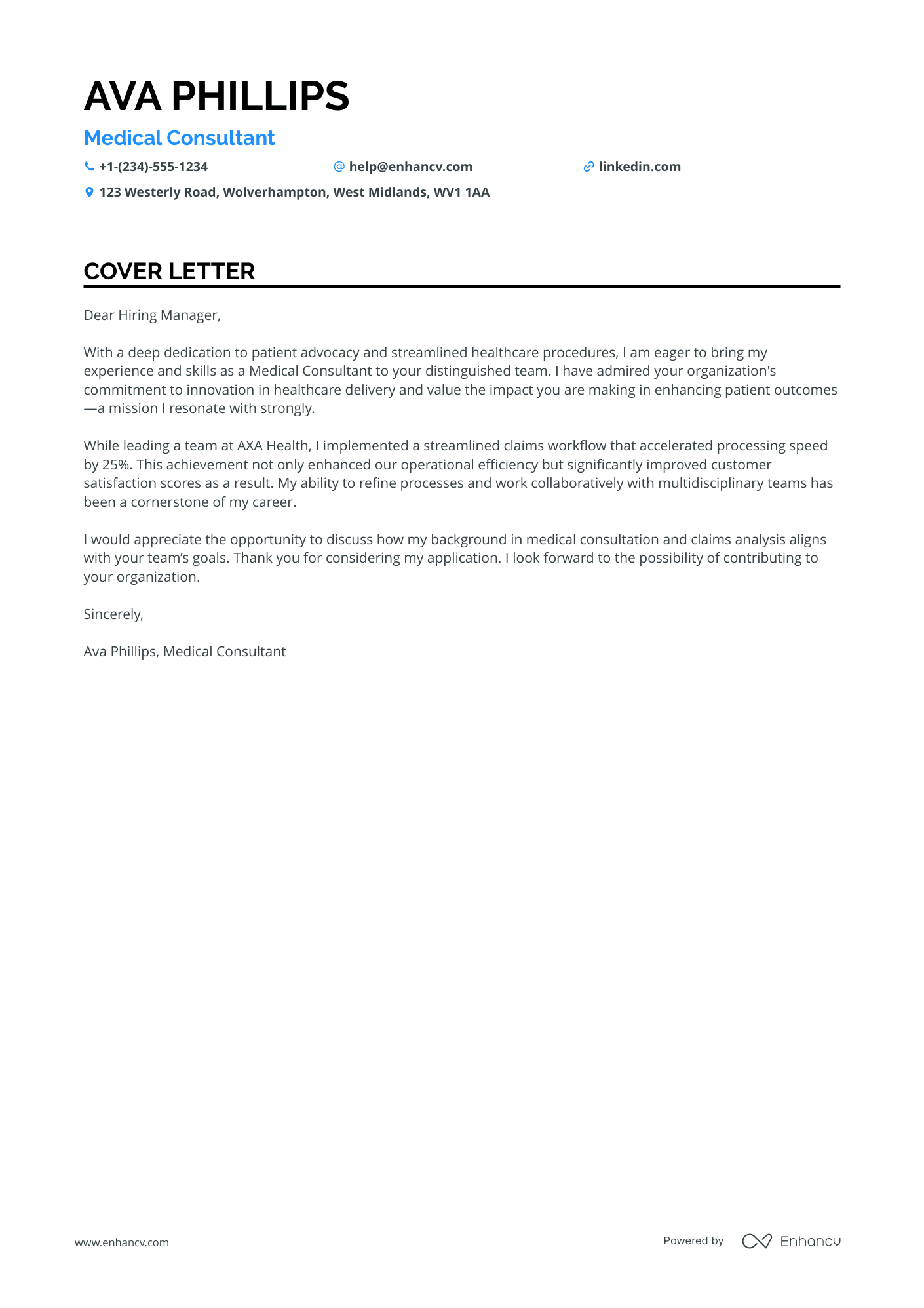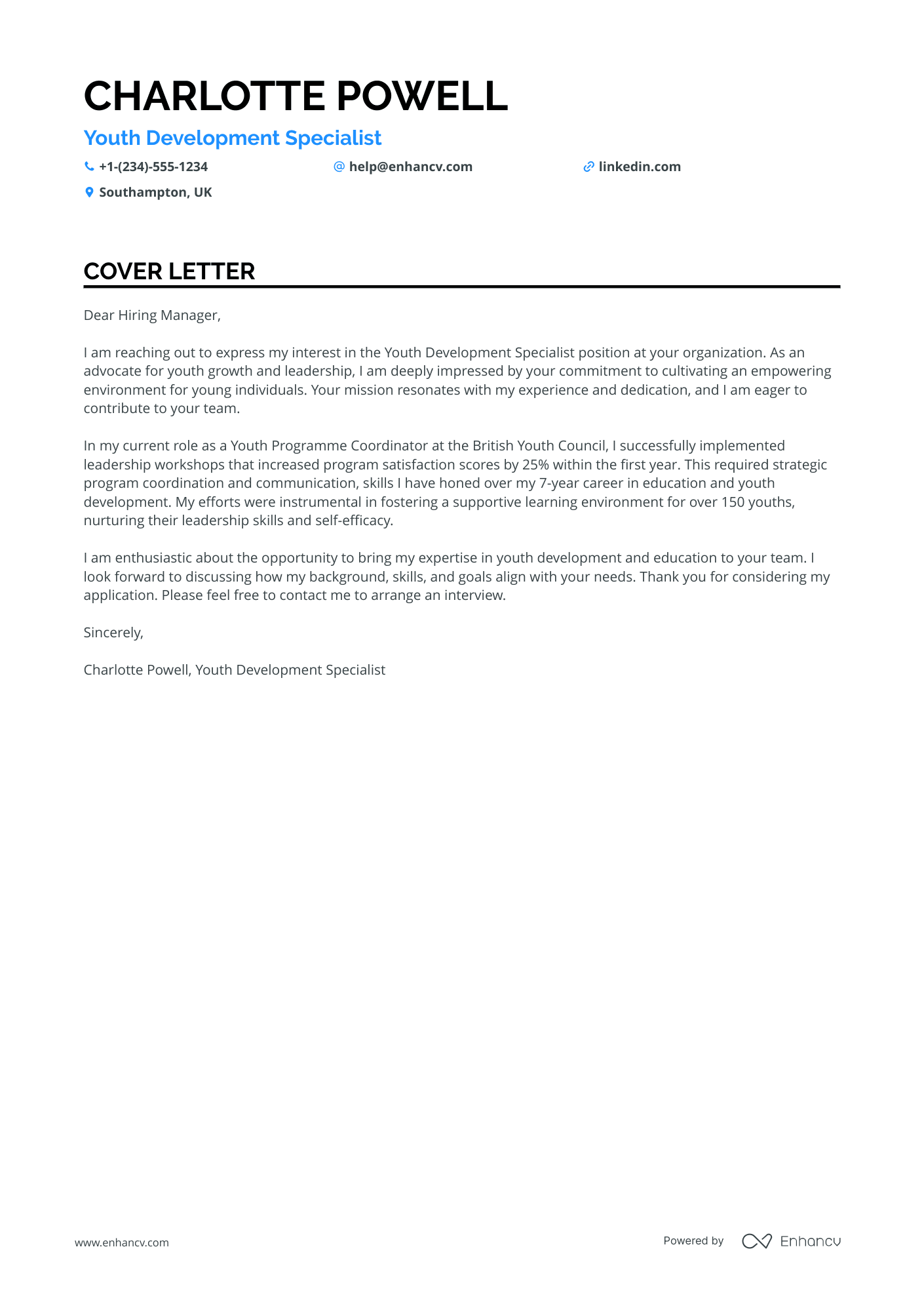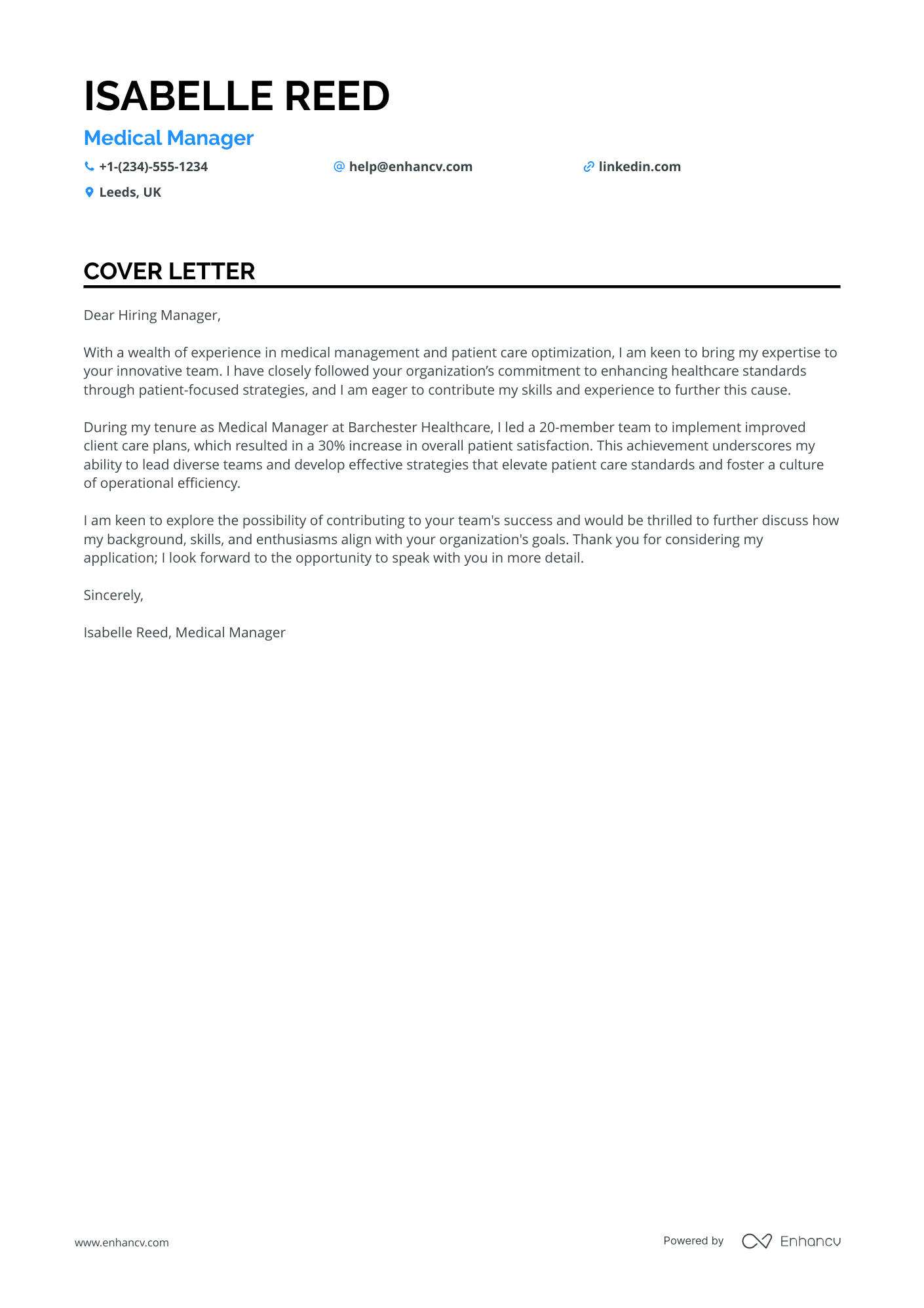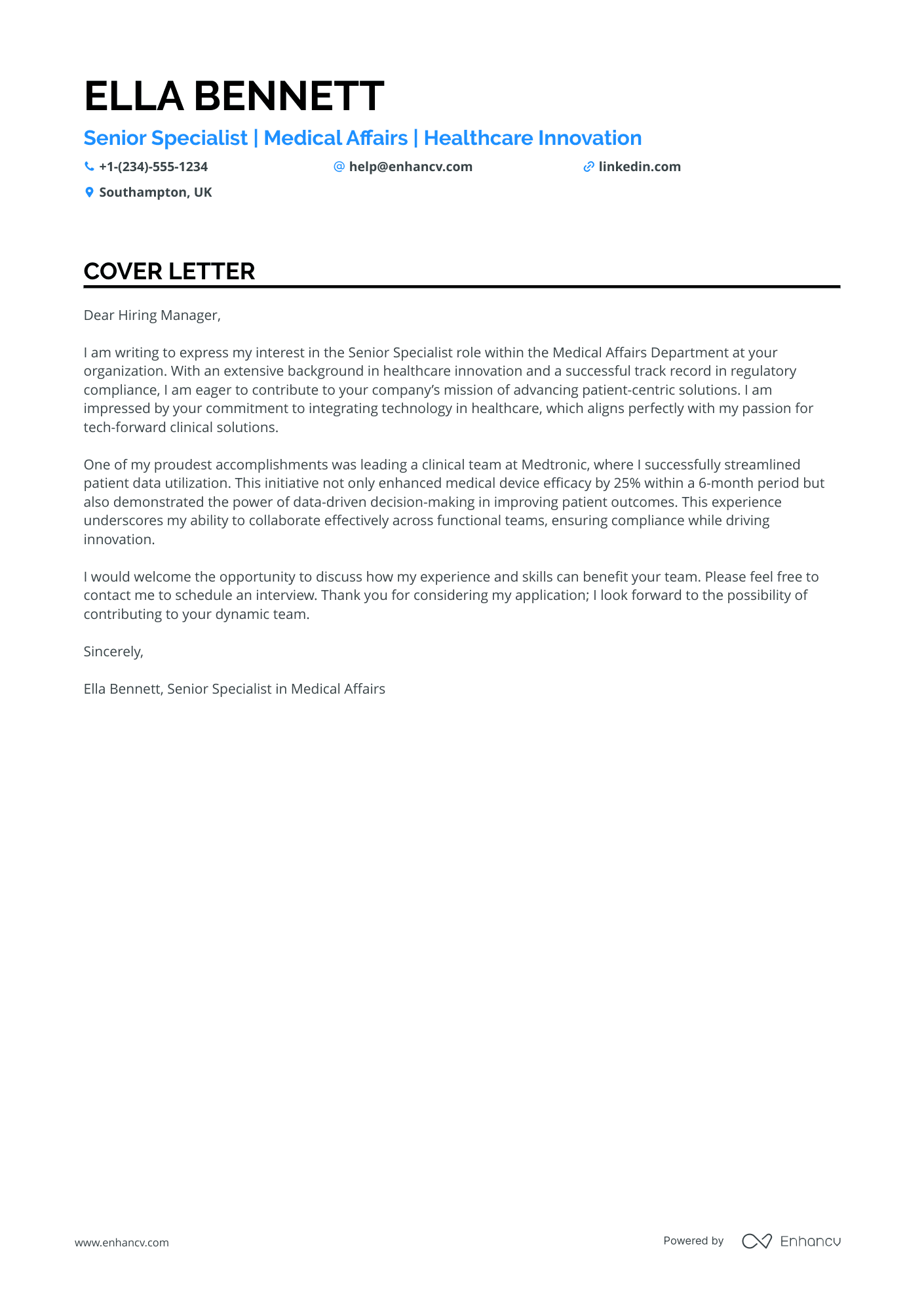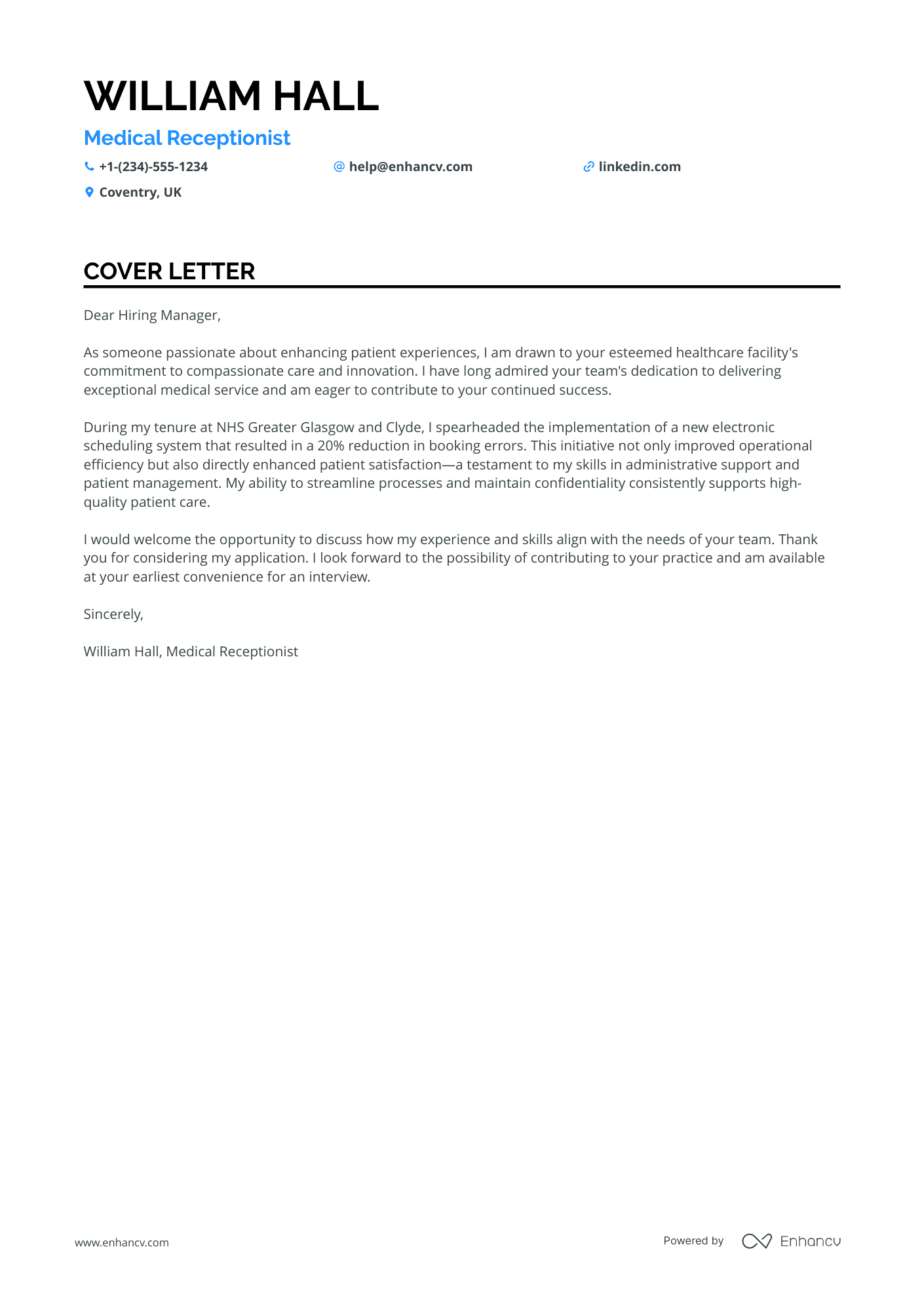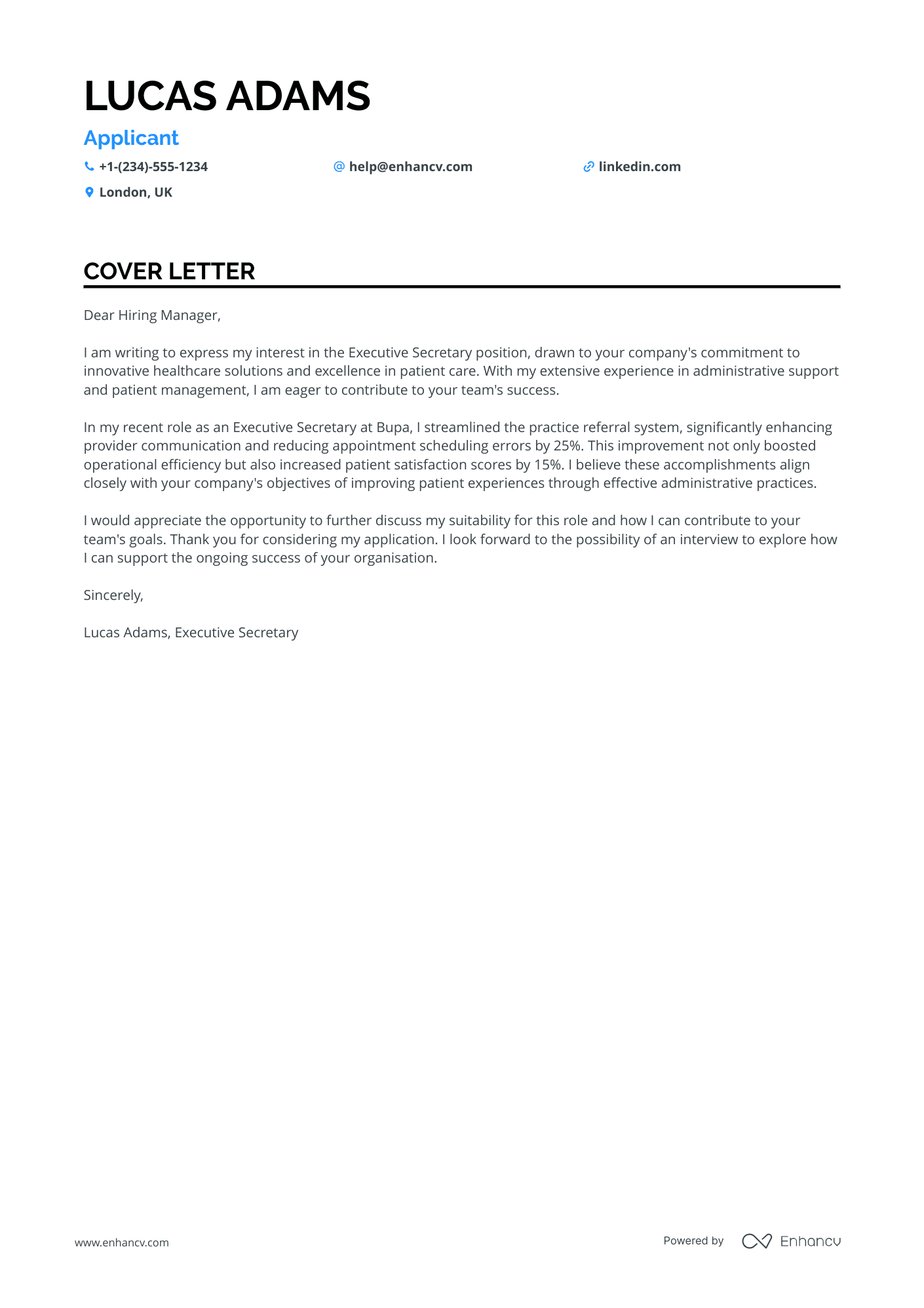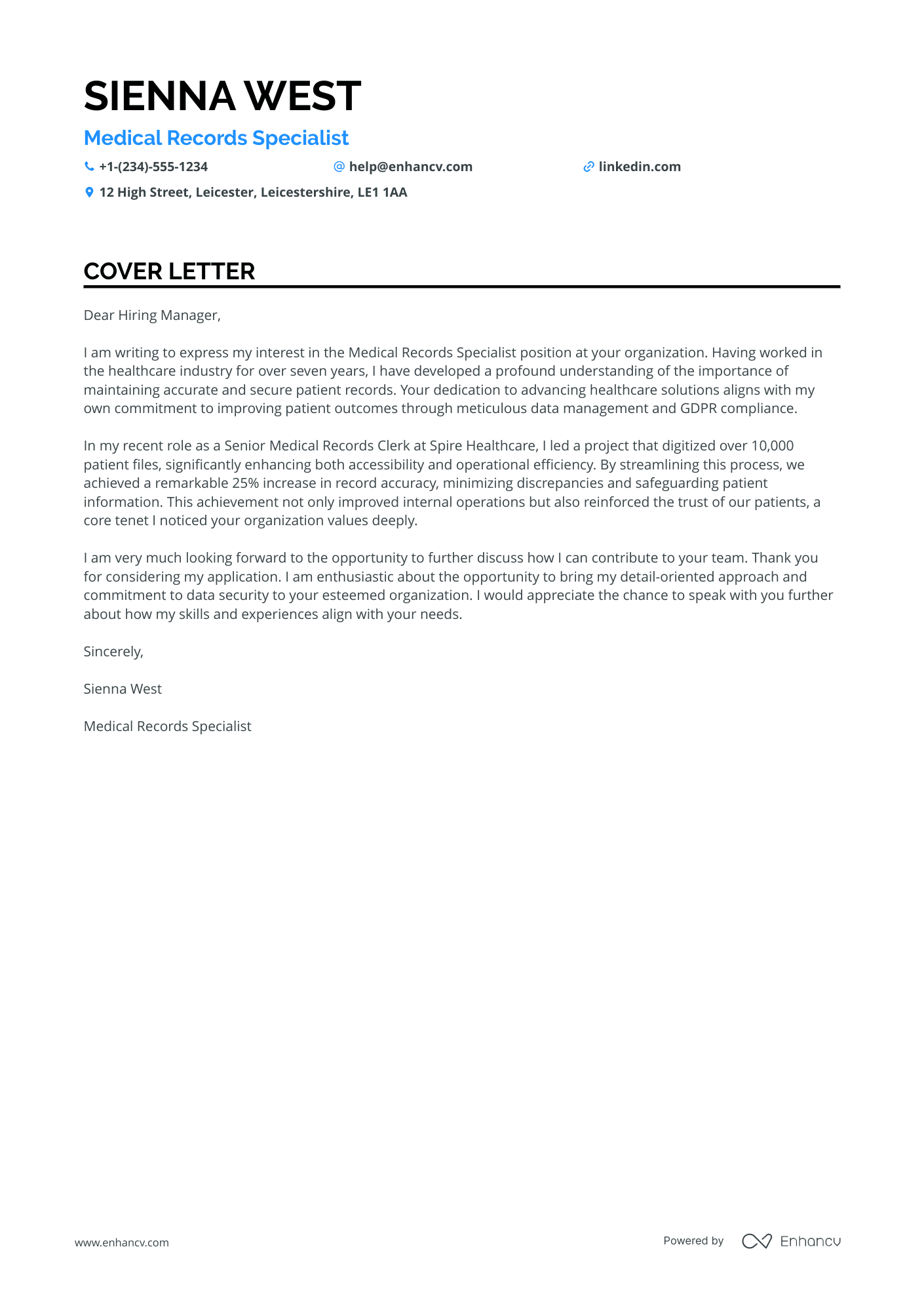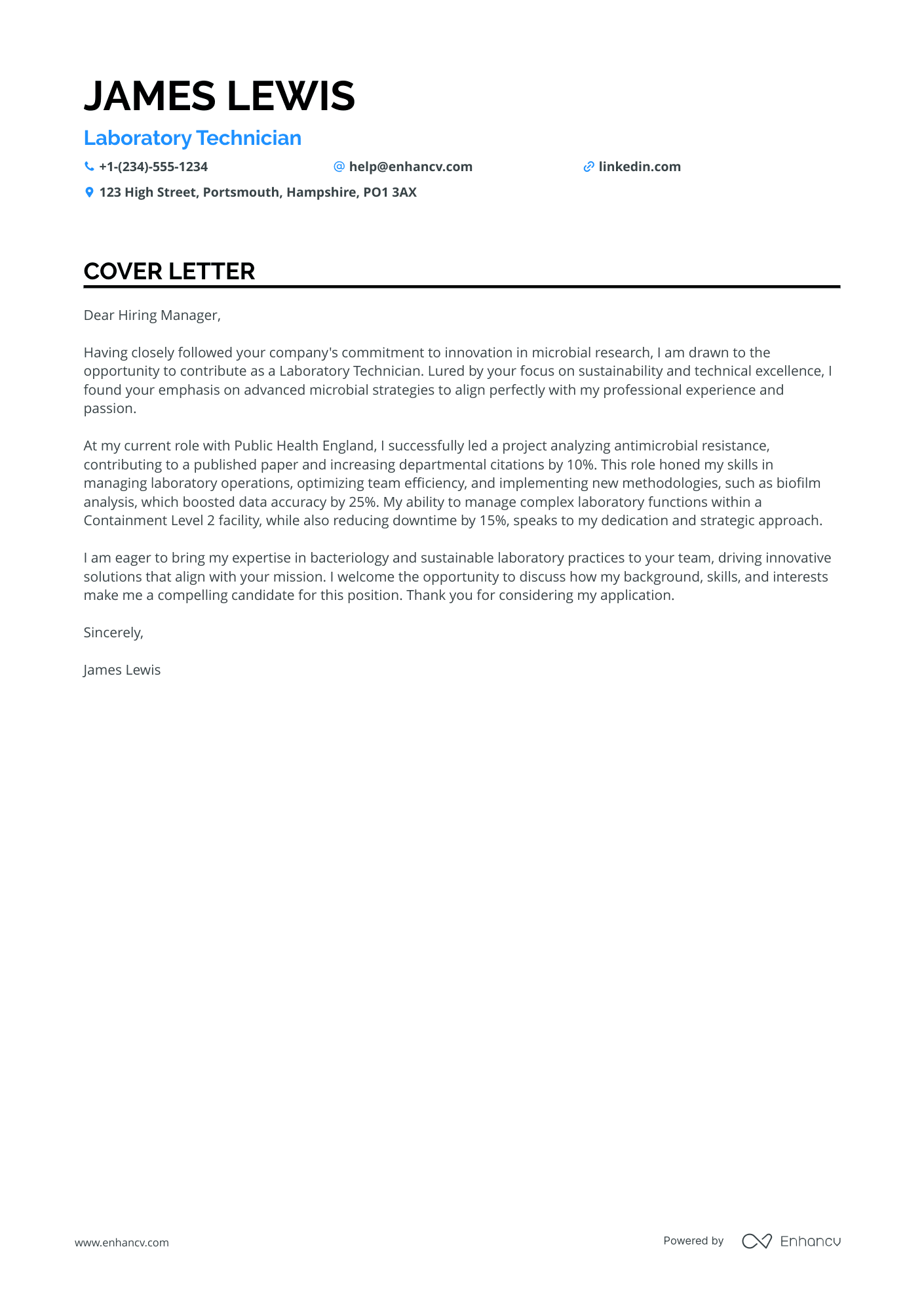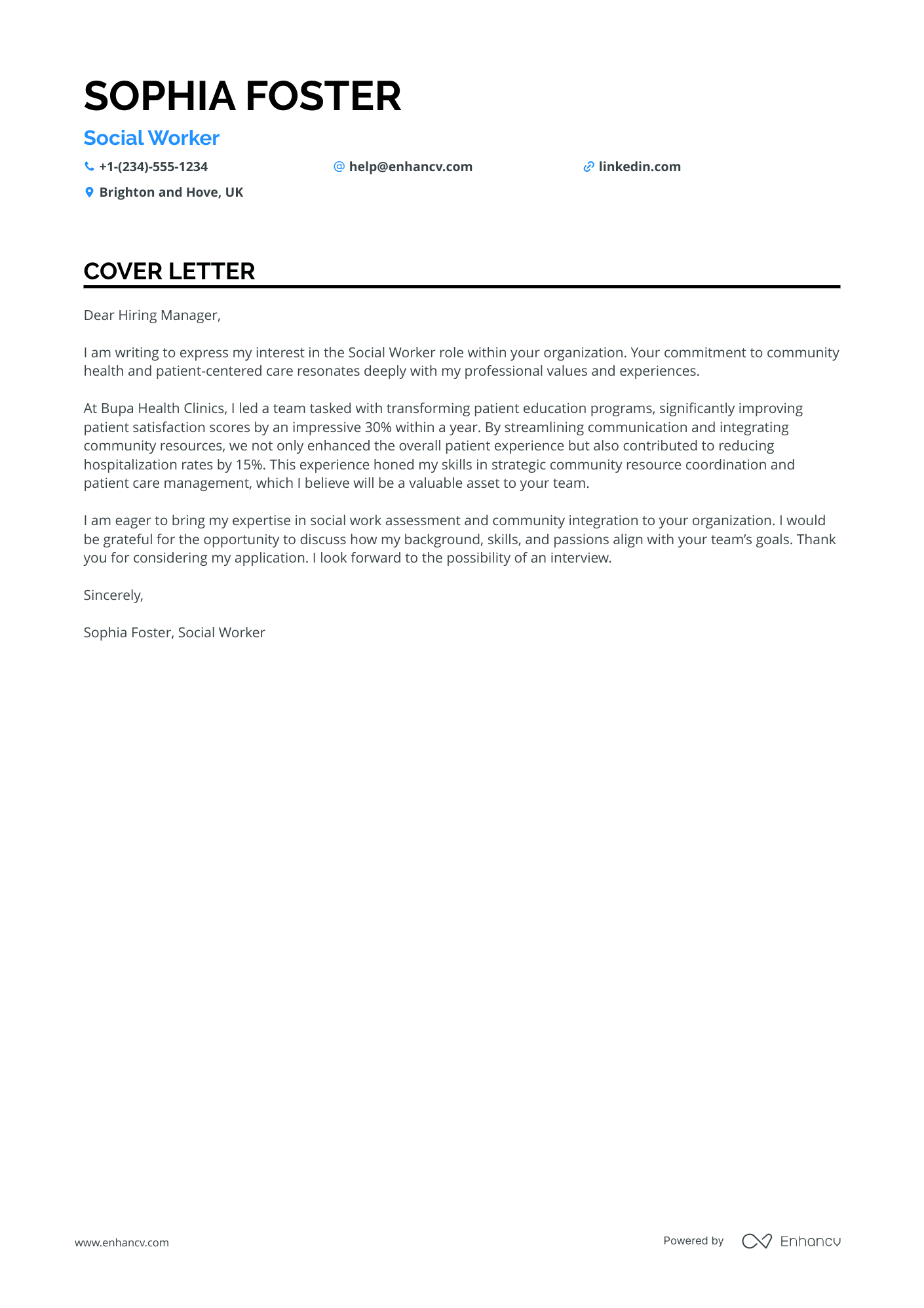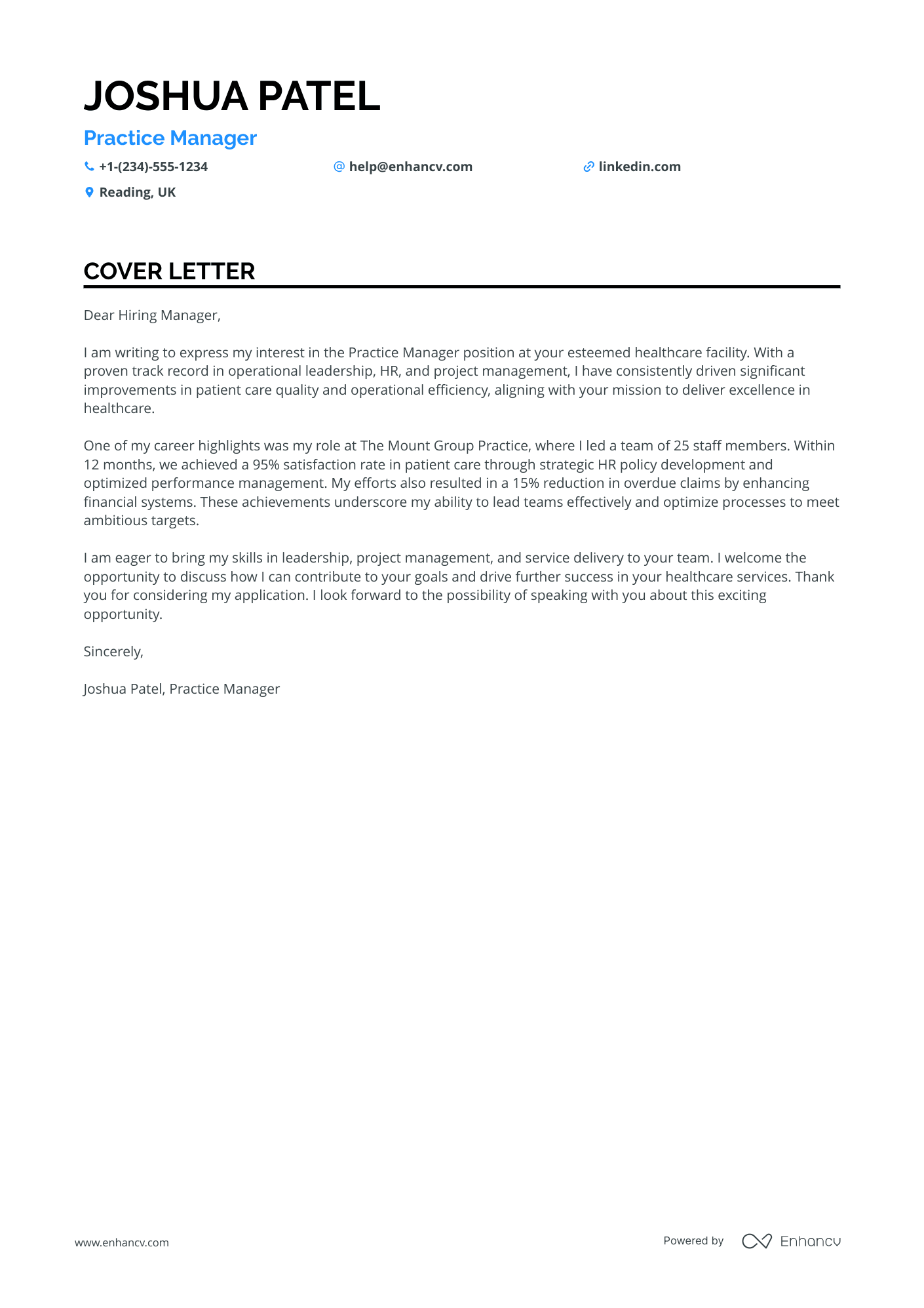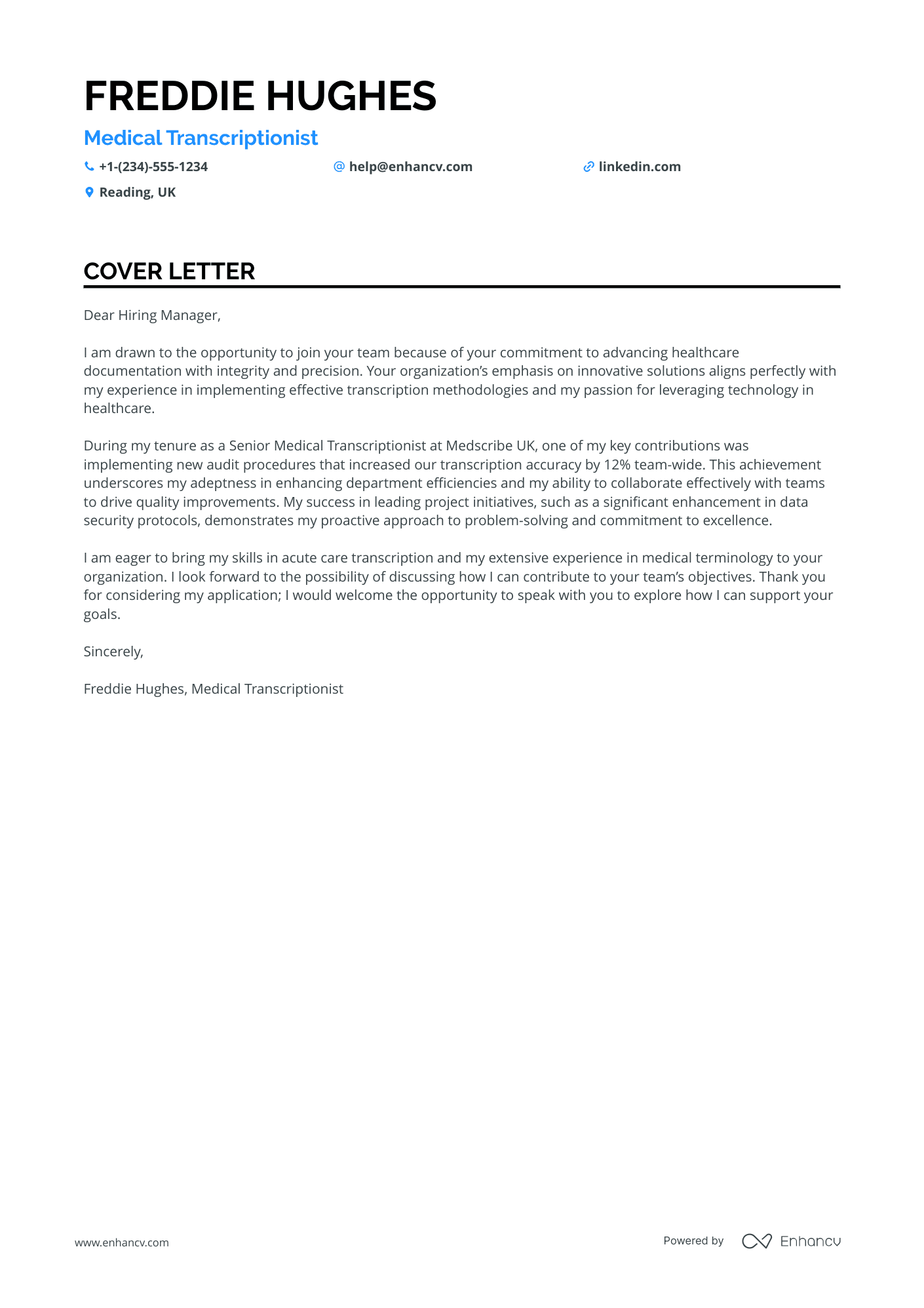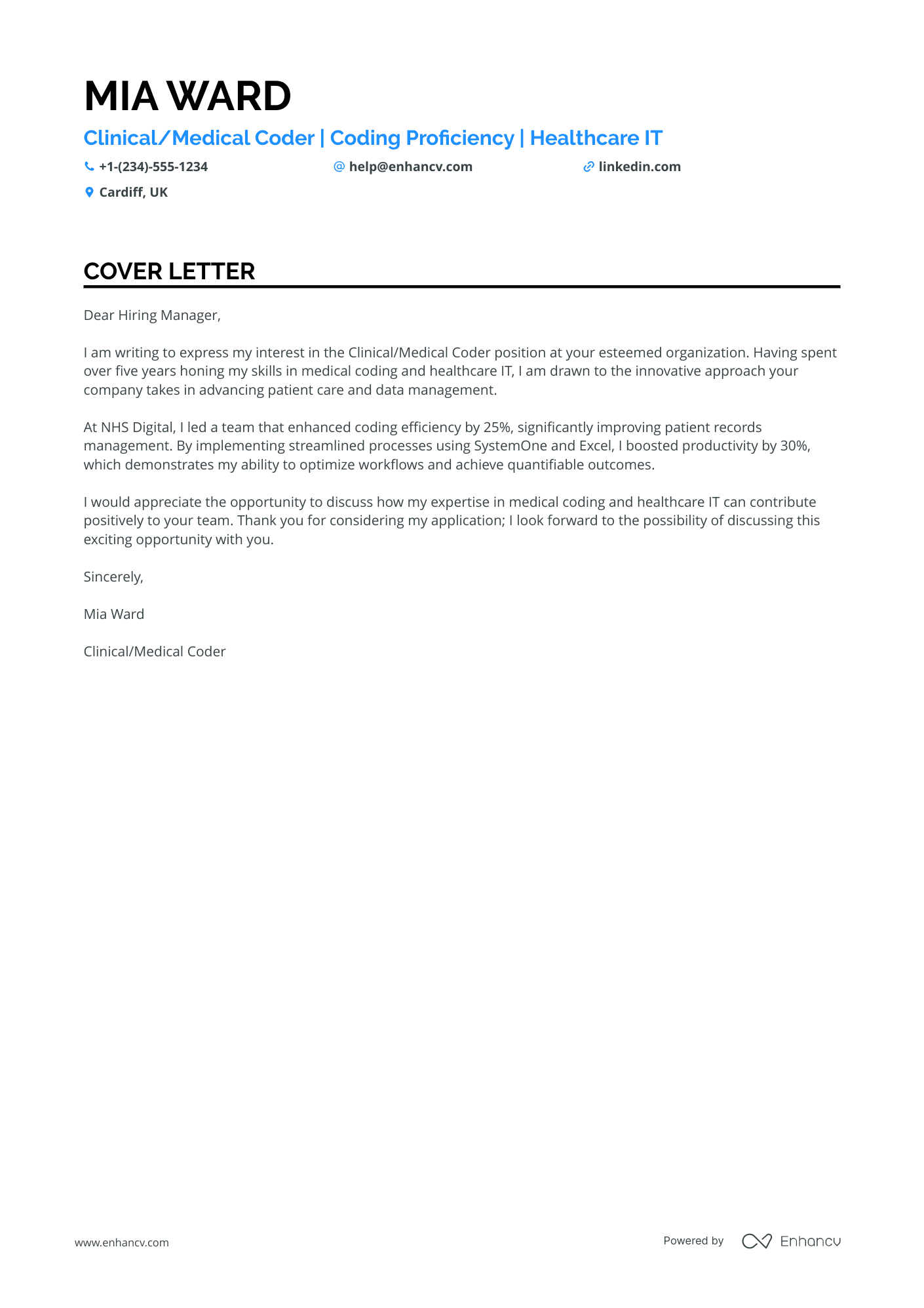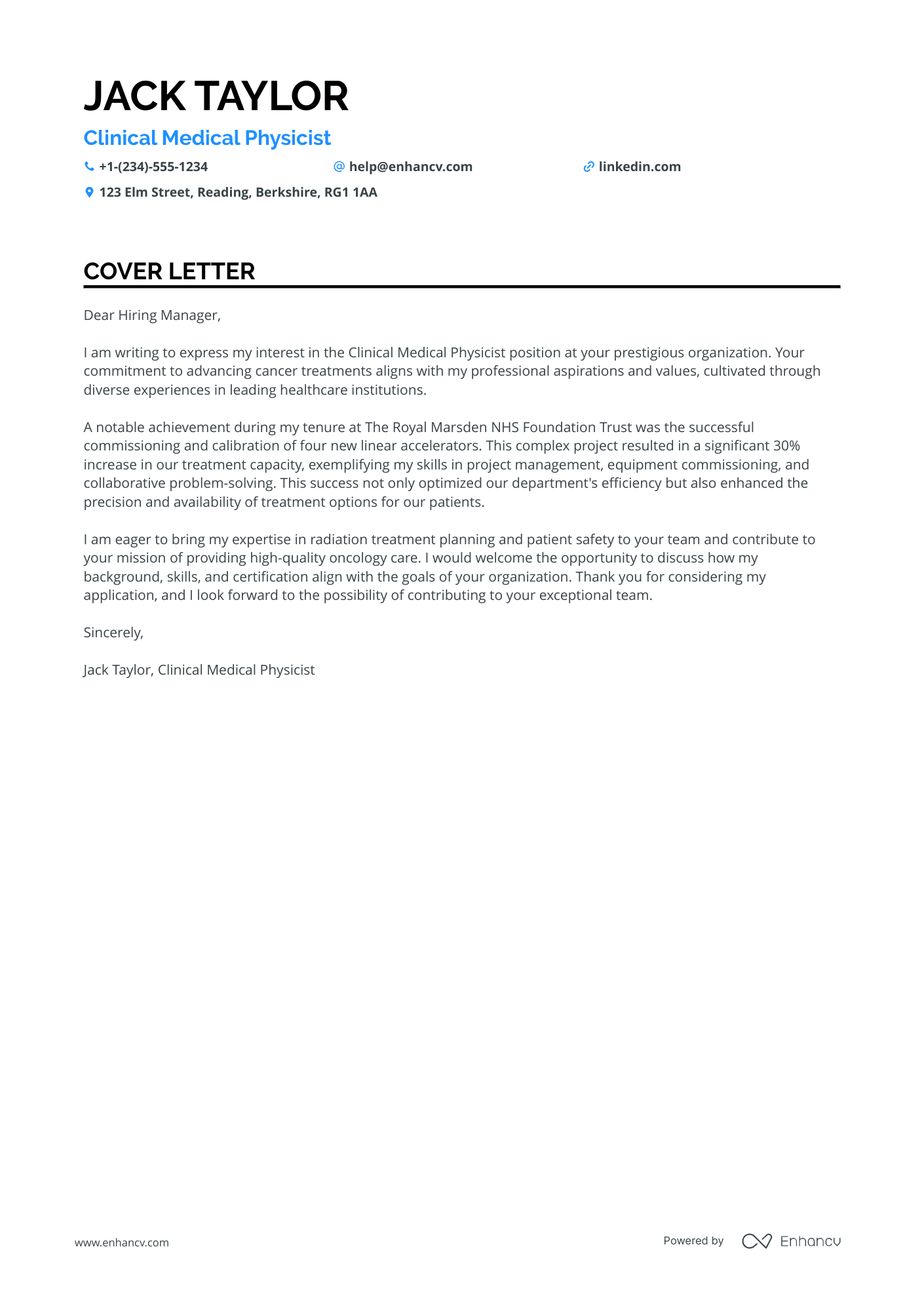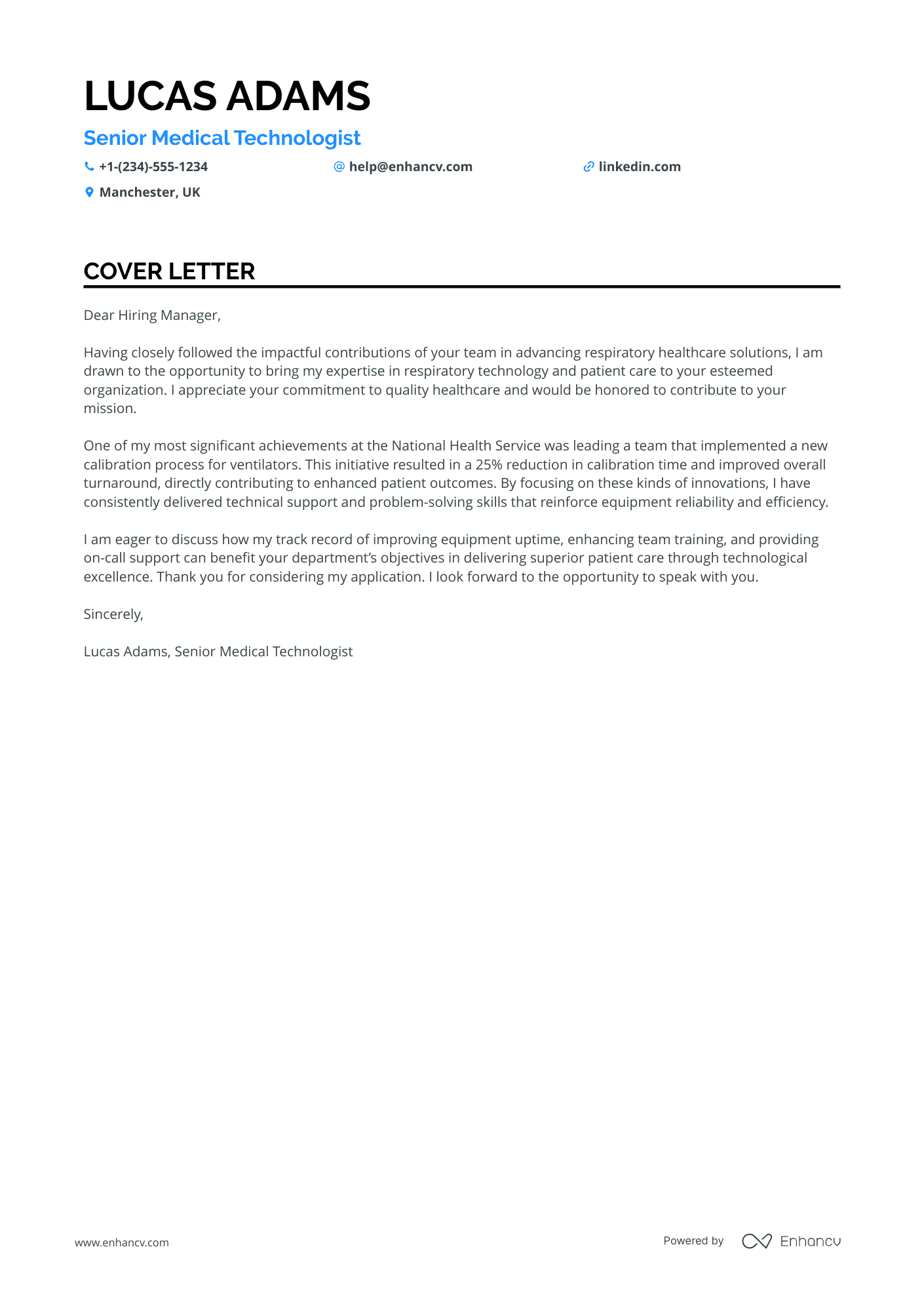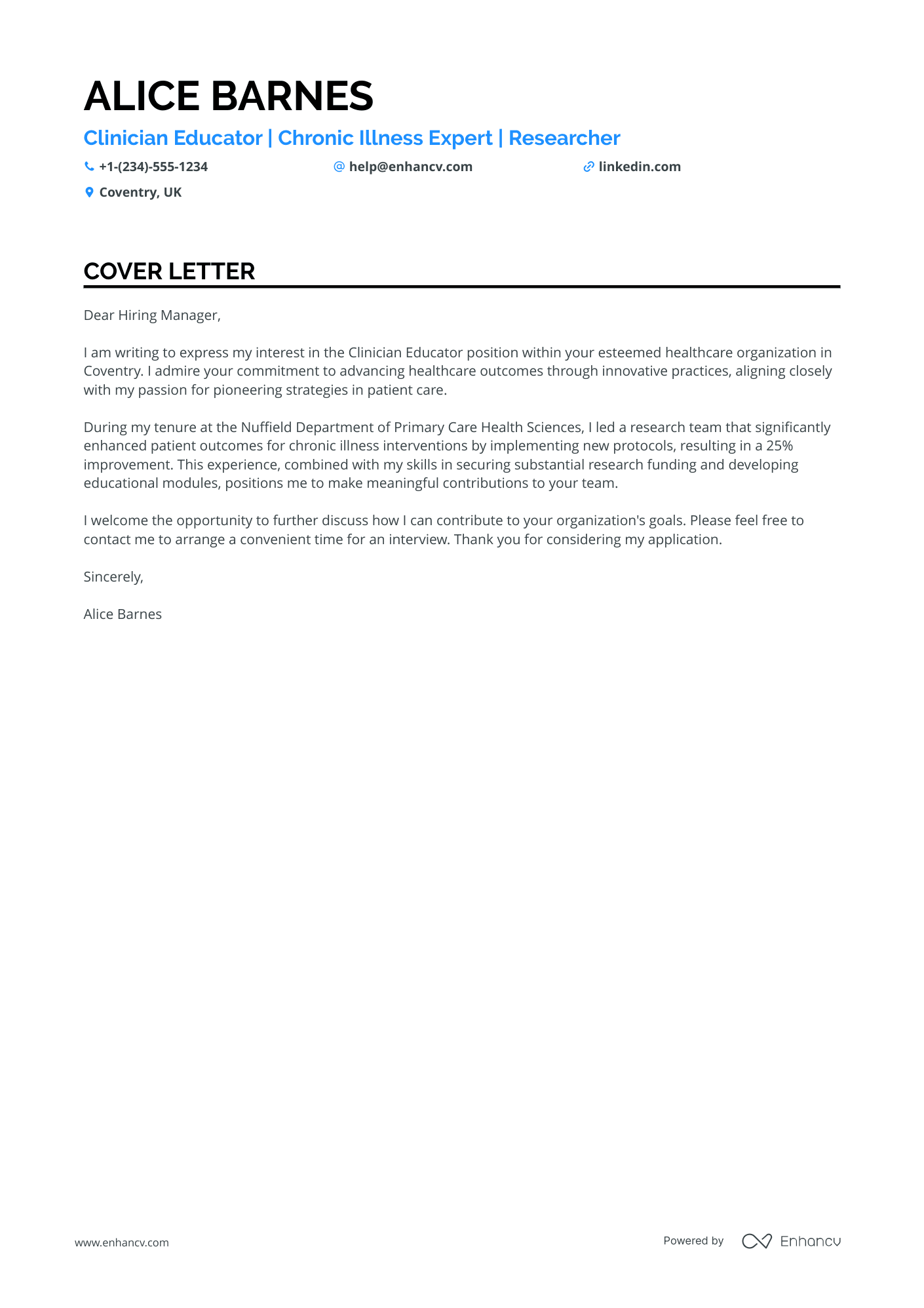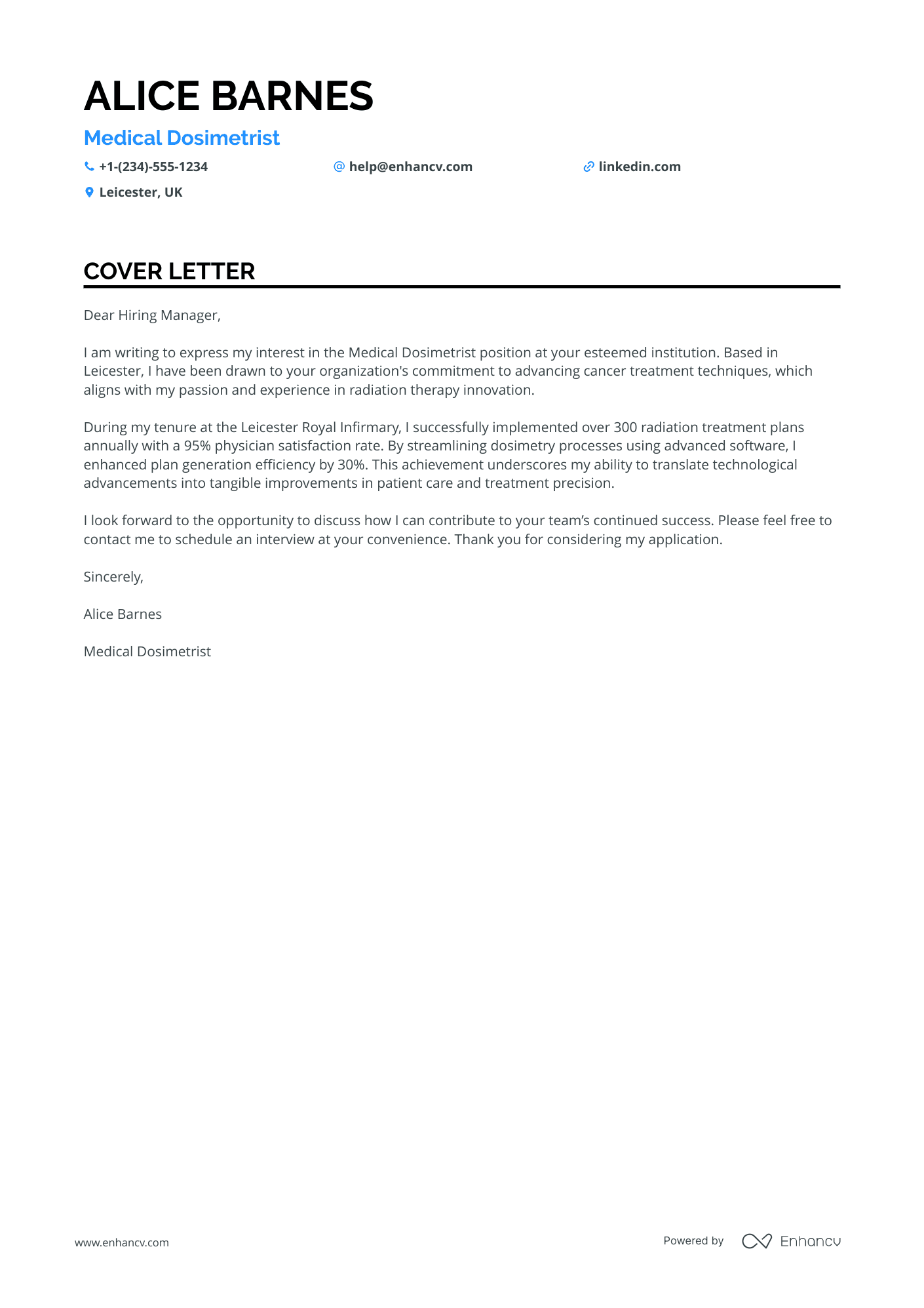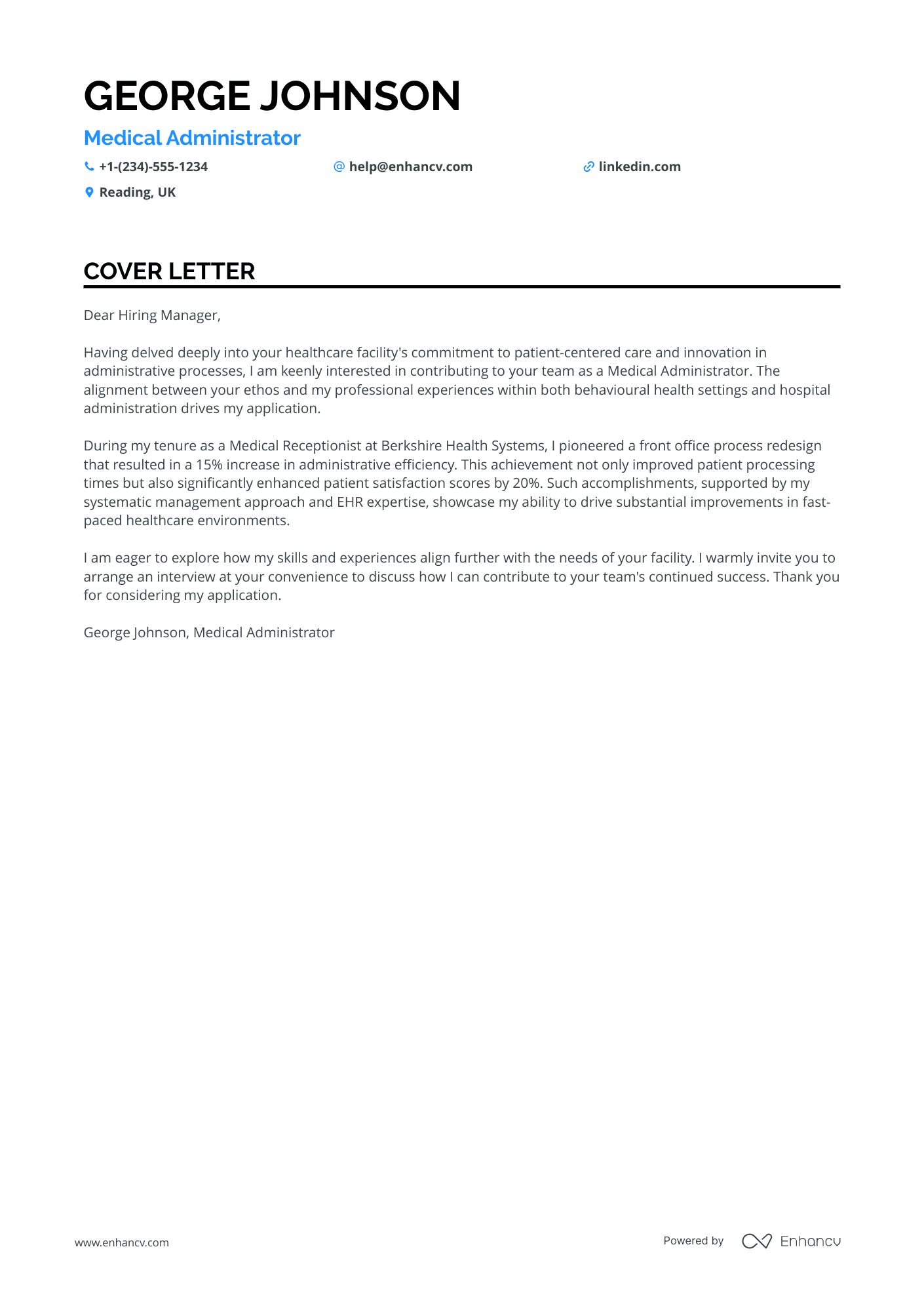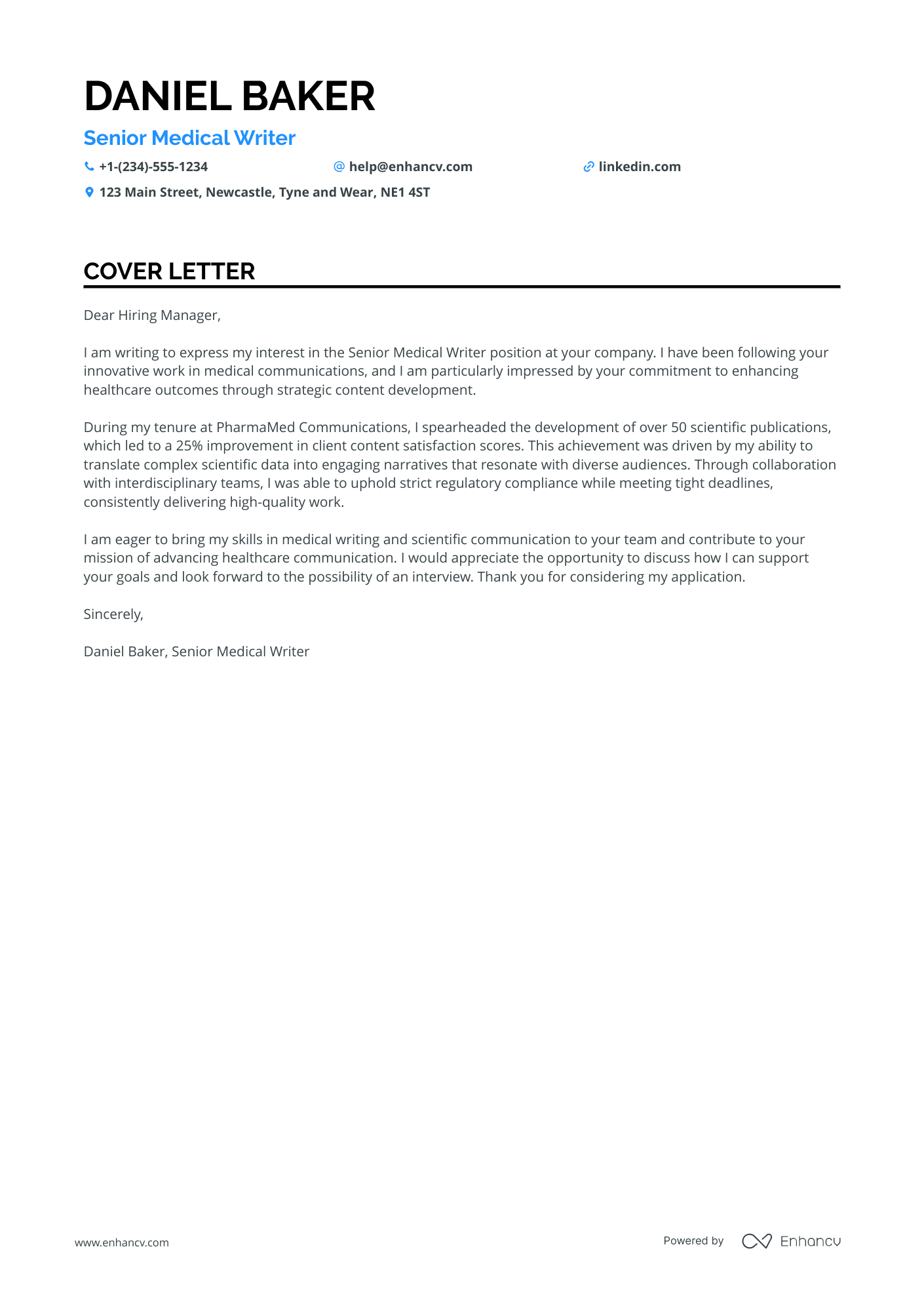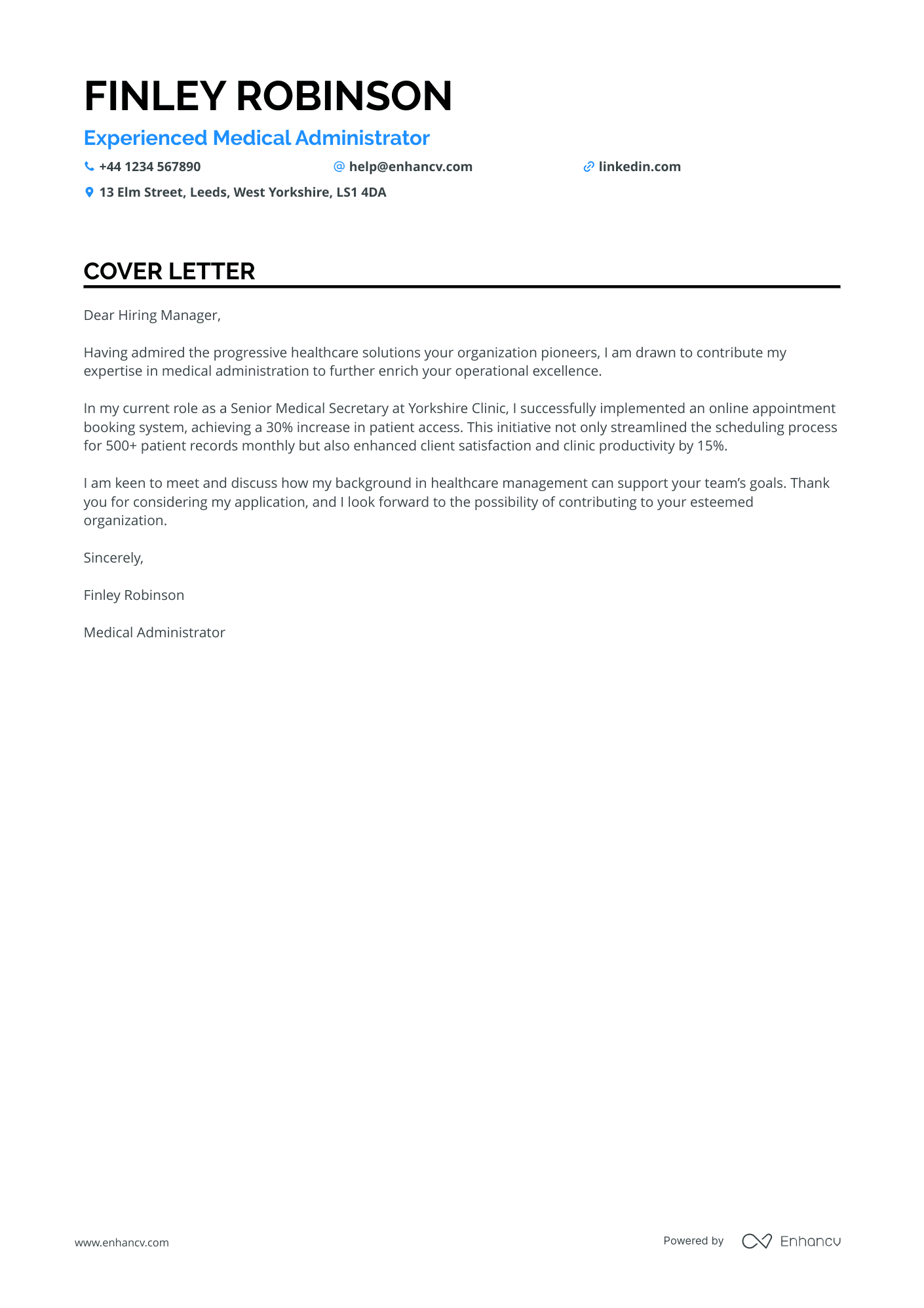Congratulations on completing your first cover letter. However, as you look back, you realise it’s simply a copy-paste of your CV.
Repeating your curriculum vitae is a common pitfall that many candidates encounter, making the cover letter redundant.
Your cover letter should provide fresh insights, adding more value to your application. It’s also the ideal space to address career gaps or major transitions that might not be covered in your CV.
In this guide, you’ll learn how to use your cover letter to demonstrate why you’re the best candidate for the role, while confidently addressing your career history and key achievements.
Cover letter examples for medical
By Experience
Medical Consultant
- Highlighting specialised skills in medical consultation and claims analysis is crucial for establishing credibility and expertise in the role.
- Emphasising achievements in streamlining claims processes and improving team productivity showcases the candidate's impact on operational efficiency and effectiveness.
- Mentioning advanced courses like "Advanced Medical Claims Management" suggests a commitment to staying updated with industry standards, which is valuable for roles focused on complex medical claims.
- Noting collaborative efforts with multidisciplinary teams highlights strong teamwork capabilities and the ability to align with regulatory standards, which are essential for this position.
Medical Director
- Proven Impact: The cover letter highlights measurable successes, such as increasing programme satisfaction scores by 25% and improving participant engagement by 15%. This showcases the candidate’s ability to deliver tangible results.
- Relevant Certifications: The inclusion of a "Certified Camp Director" credential from the American Camp Association is pertinent for a role focused on youth programmes, adding credibility and specialised expertise.
- Key Skills: Emphasising skills in youth development, leadership, programme coordination, and project management aligns well with the responsibilities of a Youth Development Specialist, affirming the candidate’s qualifications.
- Commitment to Diversity and Inclusion: Reference to developing an inclusion policy and launching a successful inclusivity initiative highlights a commitment to equity, a crucial aspect of working with diverse youth populations.
Medical Manager
- Highlight Relevant Experience: The cover letter effectively mentions specific roles and accomplishments in past positions, such as leading a 20-member healthcare team and improving medication management efficiency by 20%.
- Emphasise Certifications: CPR certification is a key qualification for a Medical Manager role, indicating the candidate's preparedness and capability in emergency situations.
- Quantify Achievements: The letter effectively quantifies achievements, showcasing a 15% reduction in medication errors and a 30% increase in patient satisfaction, providing concrete evidence of the candidate's impact.
- Showcase Leadership Skills: Emphasising team leadership abilities and accomplishments such as training over 50 care assistants and improving compliance underscores the candidate's capability to lead and mentor others.
Medical Specialist
- Highlighting certifications like the EU Medical Device Regulation (MDR) which is crucial for roles focusing on regulatory compliance in medical affairs.
- Emphasising achievements in patient data technology adoption and system efficiency improvements showcases expertise in medical technology innovation.
- Providing specific quantitative achievements such as enhancing medical device efficacy by 25% can effectively demonstrate impact and expertise in medical affairs.
- Demonstrating cross-functional collaboration and leadership skills, such as reducing errors in medical software use by 30%, is essential for roles that require teamwork across various departments.
By Role
Medical Receptionist
- Highlight Relevant Experience: Emphasise your experience in the healthcare sector, such as your role at NHS Greater Glasgow and Clyde, which showcases direct relevance to the Medical Receptionist position.
- Showcase Technical Proficiency: Mention your expertise with electronic booking systems and data protection regulations, which are crucial for efficiently handling patient information and appointments.
- Quantify Achievements: Include quantifiable achievements, like reducing appointment booking errors by 20%, to illustrate your impact and capability in optimising practice operations.
- Emphasise Communication Skills: Highlight your ability to effectively communicate with patients and clinical staff, as demonstrated by relaying over 200 patient messages monthly to ensure timely follow-up.
Medical Secretary
- Personalisation of Experience: The cover letter effectively highlights Joshua's achievement in enhancing referral processes and efficiency, which is crucial for the role of an Executive Secretary in a medical setting.
- Role-Specific Skills: It focuses on skills like Medical Records Management and Multi-disciplinary Team Collaboration, which are directly relevant to administrative support and patient management roles.
- Quantifiable Achievements: The letter uses specific, measurable improvements, such as a 30% increase in administrative productivity and a 15% increase in patient satisfaction scores, to demonstrate impact.
- Relevant Education and Training: Detailing a Master's in Healthcare Management and relevant courses like Medical Documentation and Record Keeping underscores the applicant's formal training and readiness for the healthcare sector.
Medical Records Clerk
- Highlighting GDPR compliance expertise is crucial for a Medical Records Specialist role, considering the importance of patient data protection and adherence to regulations in healthcare.
- Showcasing achievements such as improved record accuracy and reduced processing time demonstrates the candidate's ability to enhance operational efficiency and accuracy, which is vital in a medical records environment.
- Emphasising the digitisation of medical records improves data accessibility and efficiency, highlighting the candidate's initiative in modernising record management systems.
- Including certifications relevant to the role, such as GDPR Essentials and Electronic Health Records Management, underscores specialised knowledge and commitment to professional development in healthcare data management.
Medical Laboratory Technician
- Highlighting specific technical skills such as Biofilm Analysis and Antimicrobial Resistance Research to emphasise expertise in the specialised field of bacteriology, which is crucial for a Laboratory Technician role in microbiology.
- Emphasising achievements such as implementing sustainable laboratory practices and improving laboratory efficiency, which demonstrates a commitment to innovation and sustainability within high-pressure lab environments.
- Incorporating a demonstrated history of managing teams and delivering training programmes, showcasing leadership abilities that are essential for supervising lab personnel and fostering a productive work environment.
- Mentioning advanced certifications such as the Containment Level 2 Laboratory Safety certification, which underscores qualifications and commitment to maintaining stringent safety protocols in specialised lab settings.
Medical Social Worker
- Highlight Quantifiable Achievements: Mention specific improvements and achievements, such as increasing patient satisfaction by 30% and reducing hospitalisation rates by 15%, to provide concrete evidence of effectiveness in previous roles.
- Emphasise Community Resource Coordination: Discuss proven abilities in coordinating with community resources, as evidenced by a 40% increase in resource availability, which is crucial in patient care and integration roles.
- Showcase Leadership Skills: Detail leadership experiences, such as leading a team to improve patient education programmes, to demonstrate ability to manage and inspire others in a healthcare setting.
- Include Relevant Certifications and Courses: Mention courses like "Advanced Healthcare Communication" from the University of Oxford, which are important for roles requiring strong communication skills in patient care and community integration.
Medical Practice Manager
- Highlighting Relevant Experience: The cover letter effectively emphasises Joshua's extensive experience as a Practice Manager, focusing on operational leadership, HR, and project management, which are crucial for the role.
- Showcasing Proven Track Record: The letter details specific achievements, such as improving patient satisfaction and operational efficiency, supported by quantifiable metrics like a 95% satisfaction rate and 20% increased efficiency.
- Mentioning Certifications: The inclusion of a Certified Project Management Professional (PMP) certification underlines Joshua's formal expertise in project management, enhancing credibility and showcasing a dedication to professional development.
- Connecting Skills and Achievements: Key skills such as leadership, HR management, and business development are not only listed but are also connected with specific achievements, effectively demonstrating the practical application of these skills.
Medical Transcriptionist
- Highlighting Relevant Certifications: Freddie underscores specialised certifications such as the "Certified Healthcare Documentation Specialist (CHDS)" which aligns with roles requiring acute care transcription, showcasing not only expertise but also dedication to staying accredited.
- Emphasising Accomplishments in Data Security: The cover letter mentions the development and execution of data security protocols, reflecting a proactive approach in enhancing legal compliance and reducing breach incidents, which is critical in medical environments.
- Showcasing Leadership and Mentorship: Freddie’s experience initiating a Team Mentorship Programme illustrates leadership qualities and the ability to enhance team performance, a valuable asset for any organisation.
- Focusing on Substantial Quantitative Achievements: By mentioning specific outcomes such as a 25% reduction in data breach risk and a 30% reduction in turnaround time, the cover letter demonstrates tangible benefits provided to previous employers.
Medical Coder
- Highlighted Certification: The cover letter effectively mentions the "Advanced Medical Coding Certification" from AAPC, which emphasises the candidate’s specialised knowledge and commitment to accuracy—a crucial aspect for a Clinical/Medical Coder role.
- Key Skills: Proficiency in SystemOne and EMIS is highlighted, two imperative tools in medical coding, demonstrating the candidate’s technical competence essential for enhancing coding accuracy and efficiency in healthcare IT.
- Quantifiable Achievements: The letter successfully quantifies achievements, such as a 30% improvement in coding accuracy and a 25% boost in team coding efficiency, clearly showcasing the candidate’s significant impact in previous roles.
- Training and Leadership: The candidate’s experience in leading training programs that increased team proficiency by 50% highlights strong leadership and training skills, vital for fostering a productive and error-free coding environment.
Medical Physicist
- Highlighted Certifications: Mentioning certifications like the "Advanced Radiation Therapy Planning" and "Medical Physics Certification" underscores specialised knowledge, which is essential for the role of a Clinical Medical Physicist.
- Demonstrated Experience with New Technologies: The commissioning of linear accelerators and implementation of computational methods is emphasised, showcasing familiarity with and contribution to advanced technology in radiation treatment.
- Quantifiable Achievements: Including precise figures, such as a 30% increase in treatment capacity and 25% reduction in planning time, illustrates the candidate's tangible impact on departmental operations.
- Emphasis on Patient Safety and Quality Assurance: Discussing the development of QA programmes and equipment safety improvements aligns with a key responsibility of ensuring patient safety in a medical setting.
Medical Technologist
- Highlighting Certifications: Lucas emphasizes specialist certifications such as "Advanced Respiratory Equipment Management" and "Biomedical Equipment Calibration" which are crucial for a role focused on technical expertise and precision in medical technology.
- Demonstrating Impact: Mention of achievements like enhancing equipment uptime by 15% and reducing calibration time by 25% serve to illustrate Lucas's direct impact on operational efficiency and patient care, showing measurable success.
- Detailing Team Leadership: Specific examples of training over 50 multidisciplinary team members and leading a team to improve equipment uptime underscore his leadership abilities and capability to enhance team effectiveness.
- Flaunting Technical Skills & Support: The mention of extensive technical support experience and skills such as equipment calibration and safety compliance highlight Lucas's proficiency in maintaining and optimising critical medical technologies.
Medical Researcher
- Highlight certifications such as the "Chronic Disease Management Certification" to demonstrate specialised expertise in chronic illness management, which is crucial for a Clinician Educator role focussed on chronic illness.
- Emphasise the ability to secure substantial research funding, such as the £500k grant, which reflects strong research capabilities and potential contributions to the institution's growth and success.
- Showcase successful programme development and implementation, like the improved family medicine rotation and curriculum redesign, highlighting a commitment to educational excellence and student success.
- Include achievements in healthcare innovation initiatives, such as reducing hospital stay durations, to convey a proactive and results-driven approach to enhancing patient care and operational efficiency.
Medical Dosimetrist
- Highlight Strategic Achievements: This cover letter underscores significant achievements, such as reducing treatment errors by 20%, which directly demonstrates impact and capability in the field of medical dosimetry.
- Emphasise Relevant Certifications and Courses: By mentioning certifications such as the "Radiation Oncology Dosimetry Certification" and courses focused on advanced radiotherapy planning, the letter effectively highlights specialised knowledge crucial for a Medical Dosimetrist role.
- Focus on Collaborative Experiences: It illustrates the candidate's ability to work within a multidisciplinary team, which is vital in healthcare settings, leading to marked improvements such as a 25% decrease in radiation safety incidents.
- Showcase Continuous Improvement and Passion for Innovation: The enthusiasm for pioneering cancer treatment advancements highlights the candidate's drive for staying at the forefront of technological and methodological advancements in their field.
Medical Office Administrator
- Emphasising relevant certifications such as the Certified Healthcare Access Associate showcases specialised expertise beneficial for a medical administrative role.
- Highlighting experience in Electronic Health Records (EHR) and medical coding underscores the applicant's technical skills crucial for healthcare administration.
- Mentioning specific achievements, like a 15% improvement in administrative efficiency and a 20% increase in patient satisfaction, provides tangible evidence of the candidate’s capability to enhance operational processes.
- Introducing multilingual abilities, particularly Spanish, can be advantageous in roles that involve interacting with a diverse patient population.
Medical Writer
- Highlight Industry Recognition: The mention of the "Publication Excellence Award" showcases the candidate's capability in producing high-quality, impactful content, which is crucial for a senior medical writer role involving scientific communication.
- Emphasise Relevant Experience: Detailing specific achievements such as a 40% uplift in user engagement and improved client content satisfaction scores by 25% underlines the candidate's effectiveness in creating engaging and impactful content.
- Showcase Leadership and Mentorship Abilities: Leading workshops and initiating a mentorship scheme for junior writers demonstrate leadership skills and commitment to team development, which are valuable in a senior role.
- Include Certifications and Courses: Mentioning specific courses such as "Advanced Medical Writing" and "Regulatory Compliance in Pharma" reinforces the candidate's specialised knowledge and commitment to maintaining high industry standards.
Medical cover letter example
Finley Robinson
13 Elm Street, Leeds, West Yorkshire, LS1 4DA
+44 1234 567890
help@enhancv.com
- Highlight Relevant Experience: Emphasize any prior roles in the healthcare sector where you've successfully implemented systems or processes, such as my experience in deploying an online appointment booking system that improved access and productivity.
- Emphasize Measurable Achievements: Use quantifiable outcomes, like a 30% increase in patient access or a 15% boost in clinic productivity, to demonstrate the tangible impact of your contributions.
- Align with Organization's Mission: Show a clear connection between your skills and the company's goals, such as sharing a commitment to progressive healthcare solutions and patient satisfaction.
- Express Enthusiasm and Initiative: Show willingness to engage in further discussions and contribute creatively to the potential employer, conveying eagerness to become part of their team.
Importance of cover letters in the United Kingdom
Cover letters are a crucial part of your application, offering additional details beyond your CV.
Here’s why they’re essential:
- Supporting your CV: Now's your opportunity to provide some context for your experience, with more information on your key achievements and how your profile could benefit the position and organisation to which you're applying.
- Showcases your character: Taking the time to write a cover letter demonstrates that you’re proactive, organised, ambitious, and genuinely interested in the role.
- Reflects your career goals: Use the cover letter to outline your long-term career career aspirations and how this role aligns with your broader plans.
What UK employers expect from a cover letter
Your UK employers will appreciate your application if you've taken the effort to tailor your cover letter to their job requirements.
Here’s how to ensure yours ticks all the right boxes:
- Research the company thoroughly: It's not enough to have only read the job advert. Look into the company's history, products, services, and recent achievements to demonstrate your genuine interest and knowledge.
- Connect with the company’s values: Every company has core principles that shape its culture and operations. Identify these values and use your cover letter to show how they align with your professional conduct and ethics.
- Emphasise your relevant skills: Highlight specific skills that match the job description and are most in demand. Use examples from your previous experience to support your claims and set yourself apart from other candidates.
How to format a medical cover letter
Have you ever wondered about the formatting and structure of your cover letter?
Read on to discover some guidance from industry-leading professionals:
- Within the header, include your address and contact details, the employer's name and address, and the date, followed up by a personalised salutation.
- The body should should consist of an opening paragraph, middle paragraphs expanding on your unique experience and skills, and a closing paragraph.
- End with a formal sign-off and your signature.
- Choose modern fonts such as Volkhov, Chivo, or Bitter instead of the more traditional Arial or Times New Roman.
- All of ENhancv's templates maintain single-spacing with approximately 1-inch (2.5 cm) margins on all sides to ensure a neat presentation.
- Always send your cover letter as a PDF to keep the formatting intact and prevent any edits once submitted.
Your CV and cover letter maintain consistent formatting. Use the same fonts, margins, and style to create a professional and cohesive look for your application.
Finally, remember that Applicant Tracking Systems (the software some companies use to align job keywords to your experience, also known as ATS) do not read cover letters–it's intended solely for recruiters. Make it stand out by highlighting your achievements and relevant skills for the role.
How to write your medical cover letter salutation
Now it's time to make it personal—in your cover letter greeting, you should always address the hiring manager directly. Whenever possible, use their name, depending on how well you know them (e.g., 'Dear Mr Smith', 'Dear Abbie').
You can find their name by searching on LinkedIn (start by looking for the job posting and the recruiter), visiting the 'About' page of the company's website, or by calling reception or administration to enquire.
How to write your medical cover letter intro
One of the best ways to grab a hiring manager's attention? Show them the unique value you'd add to the team.
Review the skills or requirements listed in the posting and draw connections to your previous work experiences.
Focus on specific (and quantifiable) accomplishments and qualifications that align with the job description to make a strong first impression.
How to write your medical cover letter body
As you reach the body of your cover letter, you might wonder what to write in it.
Our advice? Don’t just copy your CV—choose your greatest achievement and tell its story.
Focus on how you got there using hard and soft skills, describe your involvement, and quantify the results with concrete outcomes.
Remember, recruiters aren’t looking for an epic tale of your career—they want something concise, relevant, and directly addressing their needs.
How to write a closing paragraph
There’s a wrong and a right way to close your cover letter. Here’s how.
The wrong way is to end with a signature or a formal 'Thank you in advance.'
The right way is to either promise how you’d make a positive impact on the company or ask when you can expect a response. This will highlight you as a forward-thinking candidate who’s enthusiastic about securing the role.
Conclusion
Your cover letter is an opportunity to showcase your personality and skills to potential employers. Start by addressing the hiring manager by name and tailoring your content to reflect the role’s requirements.
Include a specific example of your greatest achievement to illustrate your suitability for the position, while also expressing your enthusiasm for the company. Remember to format your letter professionally, ensuring it aligns seamlessly with your CV.
